41 why did hershey and chase label the viral dna with radioactive phosphorus
Who used bacteriophages viruses to study dna? The Hershey-Chase experiment, which demonstrated that the genetic material of phage is DNA, not protein. The experiment uses two sets of T2 bacteriophages. In one set, the protein coat is labeled with radioactive sulfur ( 35 S), not found in DNA. ... DNA was thought to be a rather simple chemical. What is are the conclusion of blender's experiment? Project Report on DNA - Biology Discussion The basis for Hershey-Chase experiment is that DNA contains phosphorus but no sulphur, whereas proteins contain sulphur but no phosphorus. Thus, Hershey and Chase were able to specifically label either (1) the phage DNA by growth in a medium containing radioactive isotope of phosphorus 32 P, in place of the normal isotope 31 P, or (2) phage protein coats by growth …
1952: Genes are Made of DNA They used radioactive sulfur and phosphorus to label and, so, distinguish viral proteins from viral DNA. After allowing labeled viruses to infect bacteria, they observed that the radioactive phosphorus enters the bacteria while the radioactive sulfur always remains outside. More Information Reference: Hershey, A.D., Chase M., 1952.
Why did hershey and chase label the viral dna with radioactive phosphorus
What did the Hershey and Chase experiment show? | AnswersDrive Hershey and Chase did two experiments to prove that DNA is the carrier of the genetic information. First, they grew phages (viruses which infect bacteria) in a medium containing radioactive sulphur (35S). This marked all the proteins of the phage (the hull) radioactive. They then used this phage to infect bacteria. Biology Chapter 12 Questions Flashcards | Quizlet viruses consist of DNA or RNA surrounded by a protein coat Explain why Hershey and Chase choose to use 32P and 35S in their experiments. Because phosphorus is only in DNA, and Sulfur is only in proteins. This allowed them to tell whether the DNA or protein coat of a bacteriophage entered the bacterial cells Why was DNA labeled with radioactive phosphorus? - Answers DNA is labeled a radioactive phosphorus because when Alfred looked at the examples 32p always pelleted with bacteria but the new Phage made by these infected bacteria contained Radioactive 32p ...
Why did hershey and chase label the viral dna with radioactive phosphorus. Hershey–Chase experiment - Wikipedia Viruses were known to be composed of a protein shell and DNA, so they chose to uniquely label each with a different elemental isotope. This allowed each to be observed and analyzed separately. Since phosphorus is contained in DNA but not amino acids, radioactive phosphorus-32 was used to label the DNA contained in the T2 phage. Radioactive sulfur-35 was used to label the protein sections of the T2 phage, because sulfur is contained in protein but not DNA. Molecular Biology, Robert Weaver, 5th Edition - Academia.edu Applications of recombinant DNA technology in gastrointestinal medicine and hepatology: Basic paradigms of molecular cell biology. Part C: Protein synthesis and post-translational processing in eukaryotic cells. by Gary Wild. Download Free PDF Download PDF Download Free PDF View PDF. Download Download PDF. Download Full PDF Package ... Why Was The Fact Of Transformation So Important? - Dr Reads Alfred Hershey and Martha Chase used the bacteriophages because of their connection to DNA. In one batch, the phages (short for bacteriophages) were grown with radioactive phosphorous, which means it was incorporated into phage DNA. The radioactivity in the pellet was measured and it was also measured in the liquid. Why did Hershey and Chase ... What did Hershey and Chase find through their experiment with the virus ... a)Hershey and Chase grew some viruses on a medium that contained radioactive phosphorus and some others on a medium that contained radioactive sulfur. Viruses grown in the presence of radioactive phosphorus contained radioactive DNA but not radioactive protein because DNA contains phosphorus but protein does not.
U.S. News | Latest National News, Videos & Photos - ABC News - ABC News Mar 31, 2019 · Get the latest breaking news across the U.S. on ABCNews.com Biochemistry PDF | PDF | Cell (Biology) | Biochemistry - Scribd ADR label for transporting goods dangerously reactive with water. Elements which are more electropositive than hydrogen such as lithium, sodium, calcium, potassium and caesium displace hydrogen from water, forming hydroxides. Being a flammable gas, the hydrogen given off is dangerous and the reaction of water with the more electropositive of ... Why did Hershey and Chase use radioactively labelled ... - Sarthaks Generally proteins contain sulphur but not phosphorous and nucleic acid (DNA) contains , phosphorous but not sulphur. Hence Hershey - Chase used radioactive isotopes of sulphur ( 35 S) and phosphorus ( 32 P) to keep separate track of viral protein and nucleic acid in culture medium. The expected result cannot be achieved, if radioactive carbon and nitrogen is used, since these molecules are ... Join LiveJournal Password requirements: 6 to 30 characters long; ASCII characters only (characters found on a standard US keyboard); must contain at least 4 different symbols;
Hershey and Chase - BioNinja Viruses grown in radioactive sulfur ( 35S) had radiolabelled proteins (sulfur is present in proteins but not DNA) · Viruses grown in radioactive phosphorus ( 32P) ... Nelson Biology 12.pdf [30j71j2z320w] - doku.pub For example, more than a dozen chemical enzymes, such as DNA polymerase, DNA ligase, primase, helicase, and topoisomerase, are required to drive DNA replication in your cells. The process of active cellular transport requires proteins, such as channel proteins, aquaporins, and carrier proteins. Many of your cells transport chemicals that are used in other parts of your … Access Denied - LiveJournal Nous voudrions effectuer une description ici mais le site que vous consultez ne nous en laisse pas la possibilité. The Hershey-Chase Experiments (1952), by Alfred Hershey ... DNA contains phosphorus, but not sulfur, whereas protein contains sulfur, but not phosphorus. Therefore, when Hershey and Chase marked phages with radioactive isotopes of those elements, they placed separate, distinguishable tags on the protein and DNA parts of the phages.
Ch.12 Flashcards | Quizlet Why did Hershey and Chase grow viruses in cultures that contained both radioactive phosphorus and radioactive sulfur? DNA contains phosphorus but no sulfur. Protein contains sulfur but no phosphorus. (By growing viruses in separate cultures, they ensured that one sample had only radioactive DNA while the other had radioactive protein.
Hershey and Chase Experiment - Biology Reader Conversely, the labelling of phage DNA by P 32 is because phosphorus constitutes the backbone of DNA so it will tag the Phage DNA, not the phage protein. Infection After radioactive labelling of the phage DNA and protein, Hershey and Chase infected the bacteria, i.e. E.coli by using the radioactively labelled T-2 phage.
Why did Hershey and Chase label the viral DNA ... - Brainly.com Hershey and Chase label the viral DNA with radioactive phosphorous and not radioactive sulfur because DNA contains phosphorus and no sulfur.
Expat Dating in Germany - chatting and dating - Front page DE Expatica is the international community’s online home away from home. A must-read for English-speaking expatriates and internationals across Europe, Expatica provides a tailored local news service and essential information on living, working, and moving to your country of choice. With in-depth features, Expatica brings the international community closer together.
LookWAYup definition of - senses, usage, synonyms, thesaurus. Online Dictionaries: Definition of Options|Tips
5.2: The Hershey - Chase Experiments - Biology LibreTexts May 14, 2022 — If radioactive phosphorus (32P) is used instead, the DNA become radioactive — because of its many phosphorus atoms — but not the proteins.
(PDF) Gene Cloning & DNA Analysis.pdf | Dede Arif - Academia.edu university of rwanda (ur) / huye campus college of science and technology (cst) school of science department of biology option: biotechnology names: ntegerejimana theogene student number: 213000753 fourth year [dna and its forms] dna and its forms
bio ch. 13-14 questions Flashcards - Quizlet They labeled the bacteriophage with radioactive isotopes to see where it goes when a virus attacks. They used phosphorus-32 and sulfur-35 because proteins ...
CH.12 & CH.13 Flashcards | Quizlet Why did Hershey and Chase label the viral DNA with radioactive phosphorus and not radioactive sulfur? DNA contains phosphorus and no sulfur. What stores information in a cell? DNA. Which of the following is a nucleotide found in DNA? a. adenine+phosphate group+thymine
a Why did Hershey and Chase use radioactive P32 and S35 in their ... (a) Hershey and Chase used radioactive P32 to label the DNA because phosphorous was present only in DNA and not proteins. [1 mark] They used S35 to label the proteins because sulphur was present only in proteins and not DNA.
Chapter 12 Flashcards | Quizlet Why did Hershey and Chase label the viral DNA with radioactive phosphorous and not radioactive sulfur? DNA contains phosphorus and no sulfur. What happens when a piece of DNA is missing? ... The bacteria infected with viruses that had radioactive DNA had become radioactive. The bacteria that had been infected with viruses marked with ...
What did hershey and chase do in their experiment? Why did Hershey and Chase use radioactively Labelled phosphorus and sulphur only? Generally proteins contain sulphur but not phosphorous and nucleic acid (DNA) contains phosphorous but not sulphur. Hence Hershey - Chase used radioactive isotopes of sulphur S) and phosphorus (P) to keep separate track of viral protein and nucleic acid in culture medium .
Biology Chapter 12 Test - Flashcards | StudyHippo.com Why did Hershey and Chase label the viral DNA with radioactive phosphorus and not radioactive sulfur? answer. DNA contains phosphorus and no sulfur. question. which of the following is a nucleotide found in DNA? answer. deoxyribose and phosphate group and cytosine. question.
Why did Hershey and Chase grow viruses in cultures that ... - Answers Radioactive sulfur and phosphorous. Proteins contain sulfur, but no phosphorous. Nucleic acids contain phosphorous, but no sulfur. The T even phages they used were nucleic acid enclosed in a ...
Biology questions on Test Flashcards | Quizlet why did Hershey and Chase label the viral DNA with radioactive phosphorus and not radioactive sulfur? phosphate groups guanine and cytosine. which of the following are found in both DNA and RNA? RNA molecules. what is produced during transcription? complementary to one strand of RNA.
Why was DNA labeled with radioactive phosphorus? - Answers DNA is labeled a radioactive phosphorus because when Alfred looked at the examples 32p always pelleted with bacteria but the new Phage made by these infected bacteria contained Radioactive 32p ...
Biology Chapter 12 Questions Flashcards | Quizlet viruses consist of DNA or RNA surrounded by a protein coat Explain why Hershey and Chase choose to use 32P and 35S in their experiments. Because phosphorus is only in DNA, and Sulfur is only in proteins. This allowed them to tell whether the DNA or protein coat of a bacteriophage entered the bacterial cells
What did the Hershey and Chase experiment show? | AnswersDrive Hershey and Chase did two experiments to prove that DNA is the carrier of the genetic information. First, they grew phages (viruses which infect bacteria) in a medium containing radioactive sulphur (35S). This marked all the proteins of the phage (the hull) radioactive. They then used this phage to infect bacteria.


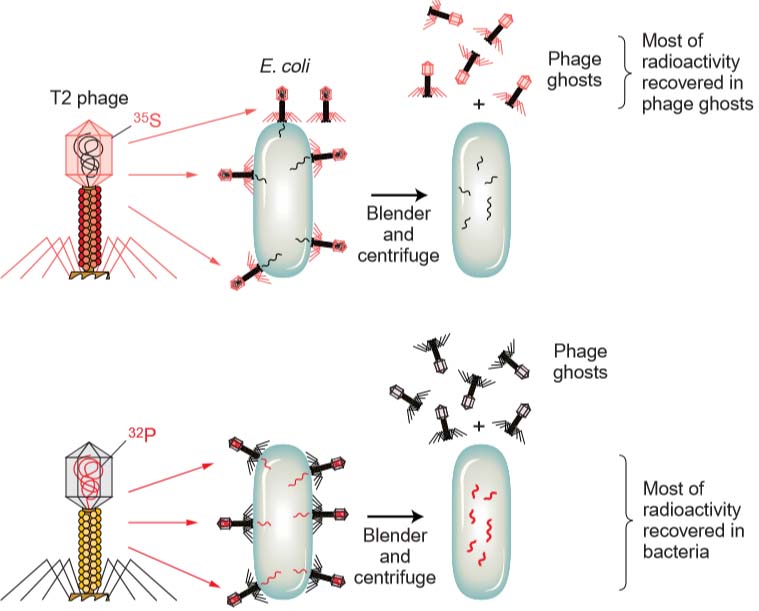
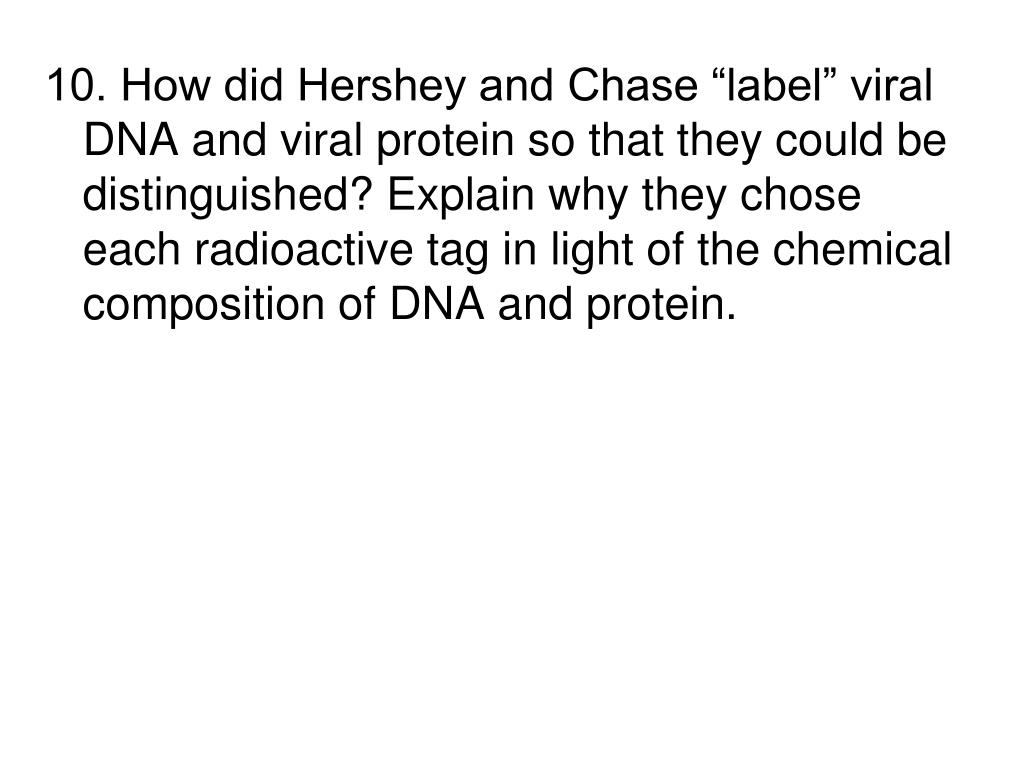




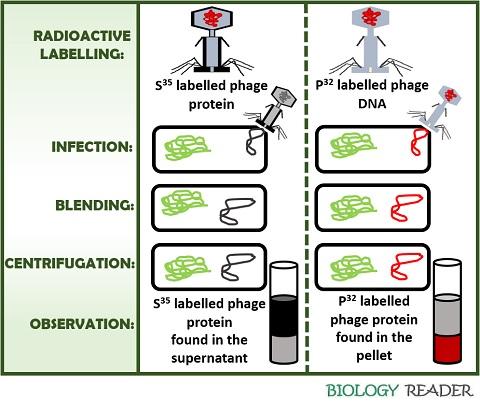




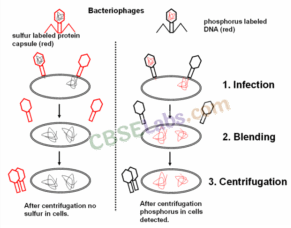



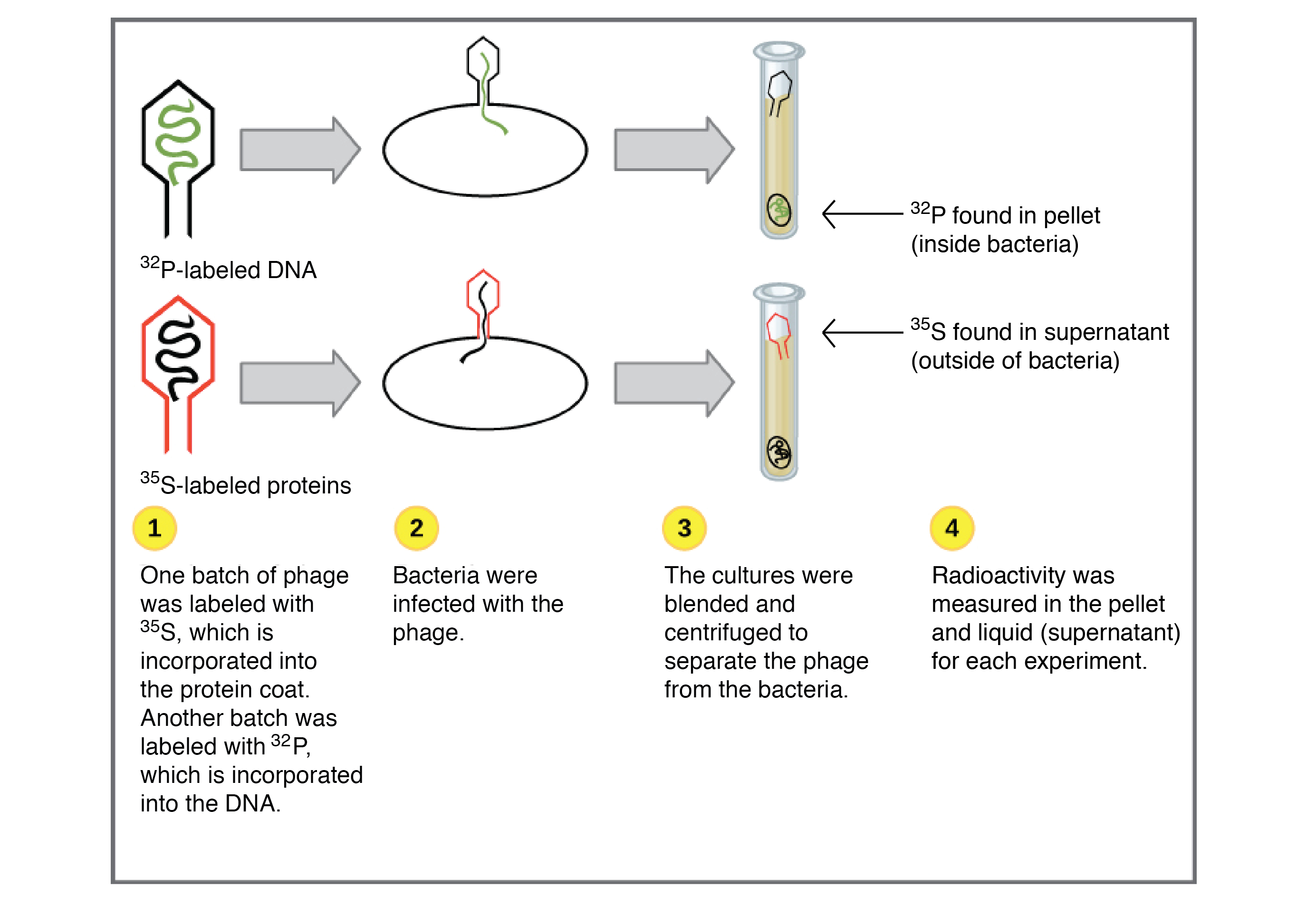
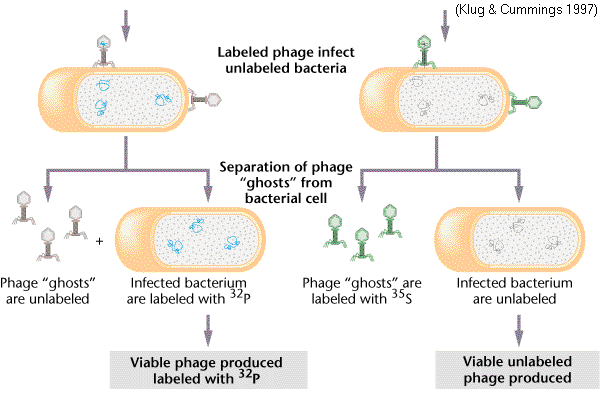





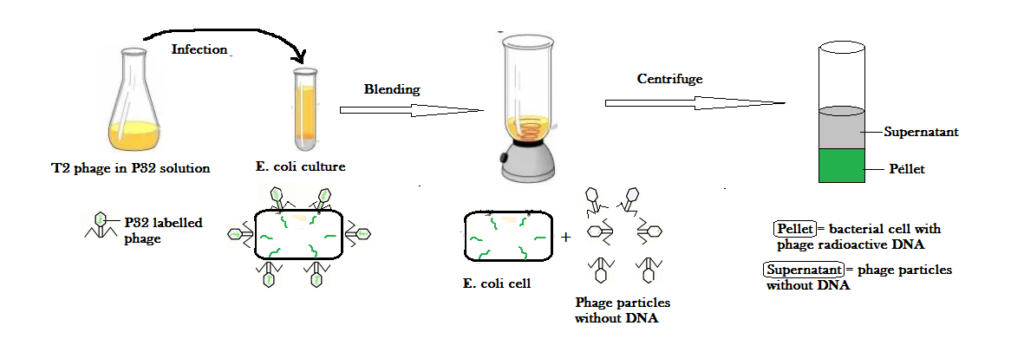


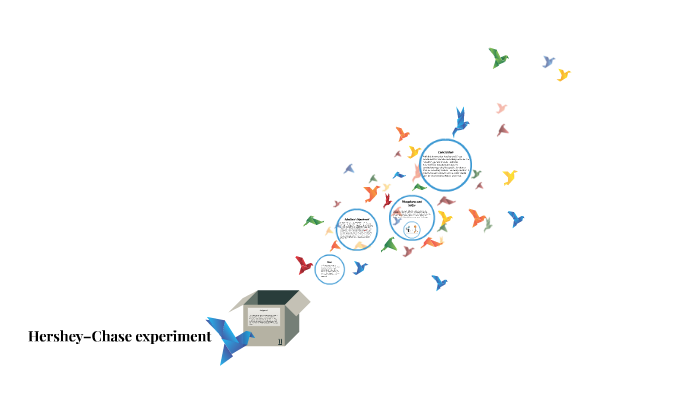

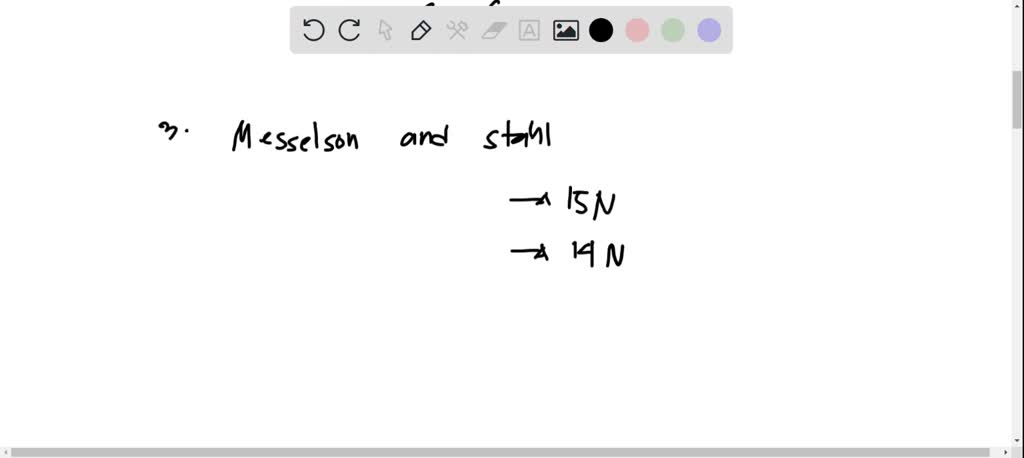
Post a Comment for "41 why did hershey and chase label the viral dna with radioactive phosphorus"